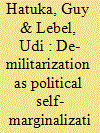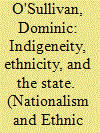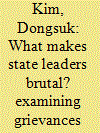| Srl | Item |
| 1 |
ID:
149187


|
|
|
|
|
| Summary/Abstract |
In the elections for the 19th and 20th Knesset, the Labor Party fared badly. The party list for these two election campaigns was almost completely devoid of ‘bithonistim’ – members of the Israeli security elite (MISEs). The article examines the placement of MISEs on the Labor Party list from 1977 up until the 2015 elections. It shows how, from the establishment of the state, the Labor Party was the natural home of MISEs, thereby becoming the dominant party with regard to the Israeli agenda, in which military and security issues occupy a central place. The decrease in the number of MISEs on the Labor list, and their replacement with Member of parliament who are associated more closely with civil issues, have marginalized the Labor Party in relation to the public agenda. The article shows how in Israel, a society organized around cultural militarism, the party’s demilitarization has led to political marginalization.
|
|
|
|
|
|
|
|
|
|
|
|
|
|
|
|
| 2 |
ID:
129836


|
|
|
|
|
| Publication |
2014.
|
| Summary/Abstract |
This article draws on the politics of indigeneity to distinguish the claims of first occupancy from simple ethnic identity politics, illustrating that relative political marginalization in Australasia is not so much a function of minority status but of indigeneity itself. The politics of indigeneity's aim is to create political space for self-determination and a particular indigenous share in the sovereign authority of the nation-state itself. The Australasian states are compared with Fiji to demonstrate that the significance of historical constraints on political authority transcend the withdrawal of a colonial power and the restoration of collective indigenous majority population status.
|
|
|
|
|
|
|
|
|
|
|
|
|
|
|
|
| 3 |
ID:
099851


|
|
|
|
|
| Publication |
2010.
|
| Summary/Abstract |
What makes state leaders enmeshed in civil war commit mass killings against their own populations? This article explores this question by synthesizing grievances and mass killing. It investigates how factors or contexts that breed or exacerbate grievances can trigger state-sponsored mass killing during civil war. Severe political and economic marginalization and a history of intense armed conflict can engender staunch civilian support for insurgents, which prompts embattled rulers to orchestrate mass killing as a strategy of neutralizing insurgent combatants and warding off future rebellion. To verify this argument, a dataset is constructed that contains information on civil wars from 1945 to 2007 and large-N statistical analyses are conducted. The results corroborate the author's theoretical arguments with respect to political marginalization and history of armed conflict, but not with respect to economic marginalization. The argument and findings suggest that (1) grievances account for mass killing perpetrated by the government during civil war and (2) different sources of grievances have varying effects on mass killing.
|
|
|
|
|
|
|
|
|
|
|
|
|
|
|
|